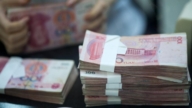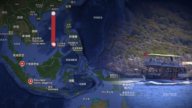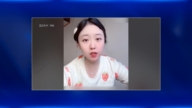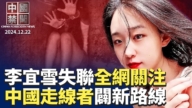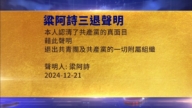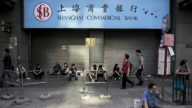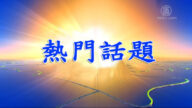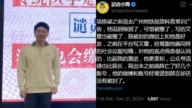【新唐人2013年04月03日訊】前中共總書記胡耀邦之子、全國工商聯原黨組書記胡德平透露,中共今年可能會展開內部整風活動。他建議,把改革和整黨、學習憲法結合,由黨中央推進。不過,學者指出,如果中共不觸動一黨專制進行根本改革,中國可能將發生革命。
香港《明報》4月2號報導,胡德平出席他的新書《改革放言錄》座談會時表示,下一步改革要由中共中央推進,結合整風和整黨。他說:「國務院哪個部門、哪個領域的改革都有困難,遇到阻力相當大,就算是做了,也往往會變樣,一個部門很難推,國務院來搞也有難度,非得要共產黨來搞。」
胡德平還說,改革應該與整黨結合,「輕則整風,重則清黨,改革中謀私、為利益集團工作的,情節嚴重的,可以清掉。」
他指出,整黨同時也要強調學習憲法,中共要在憲法、法律範圍中活動。
胡德平在座談會上引用了王立軍的事例說,王把沒罪的「也可以拉出罪來」,沒事的「還有刑訊逼供」,甚至主張公安在生命遇威脅時可無論對錯擊斃他人。深圳最近也有街道規定民警擊斃犯罪份子可獲獎勵,這些做法都是在踐踏法治。因此,談改革更需要針對現實。
現任「中國管理科學院」農業經濟技術研究所研究員及副所長的姚監復認為,現在中共連鄧小平強調的黨政基本分開也沒有了,因此政治體制必須改革黨:消弱它的特權,取消利益集團的利益。
中國管理科學院研究員姚監復:「改革要自己改自己,要自己割自己肉,也是困難的。所以,現在很可能出現一個政治不改革,經濟在改革,講民生主義,講民族主義,不講民權主義,只要能混得過去。」
姚監復指出,中共在執政前就明白了中國社會問題的實質所在,如40年代,重慶《新華日報》、和延安《解放日報》,曾多次刊登中共領導人的表態。
姚監復:「上個世紀40年代,毛提出了改革的方向和原則就是:廢除一個黨、一個主義、一個領袖的法西斯獨裁專制。這個在毛澤東選集第三卷912頁就有。 現在要改,就應該落實毛澤東上個世紀40年代說的廢除一黨專政,如果不是這樣做,就不是政治體制改革,只是提高效率的政府機構改革、行政機構改革。」
胡德平新書《改革放言錄》,收集了胡德平1984年以來的文章、講話、訪談和書信,主題包括改革開放、民主法治、民營經濟等。
胡德平在前言寫道,「放言」意指沒有恐懼感的暢所慾言。而他對前重慶市委書記薄熙來「唱紅打黑」的看法是,必須「根本否定文革」,不應再用「文革」的方法解決當前矛盾,而是要用民主法制、政治體制改革和憲法。
姚監復指出,中共要改革,首先要按國際規矩辦事:一個政黨不能用國家財政、和納稅人的錢來養活,黨的幹部與公務員無關。當然還有官員的退休制度等。
姚監復:「如果自己不改革,不能從上而下的和平改革,就可能積纍矛盾到一定的深度,出現爆炸性局面,來自下而上的改革就成了革命。這一點 ,領導有清醒的認識,例如王岐山讓大家看託克維爾的《舊制度和大革命》。」
《舊制度與大改革》剖析了腐敗和不得人心的專制社會,發生大革命的原因。
《人民日報》也承認,當前中國社會背景複雜和社會矛盾激化的處境,與「法國大革命」時期有某種相似性。
姚監復表示,從目前看,中共還是繼續用維穩的策略,而不是用輿論公開、新聞自由來對民眾減壓。姚監復說,未來出現「舊制度」下的大革命不可避免。
採訪/劉惠 編輯/宋風 後製/蕭宇
Hu Deping: Cleaning up of the Party May Be Staged
Hu Deping is the son of Hu Yaobang,
former Chinese Communist Party(CCP) leader.
Hu Deping recently remarked on the CCP’s tidying of
the Party, which may be staged in this year.
Hu Deping argued that the CCP shall push for reforms, together
with ideological rectification and study of the Constitution.
Yet, scholars warn if the CCP fails to reform its one-party rule,
China will see a down-top revolution.
On April 2, Hong Kong’s Ming Pao newspaper reported on
Hu Deping’s talks at a forum on his new book.
He said the CCP Central Committee should push
for reforms, combined with an ideological rectification and tidying of the Party.
“Major resistance will make it difficult to carry out
reforms in all state departments and in all fields.
Even if it’s done, the outcome will result in some distortion.
It’s hard for any department or the State Council to
dominate reforms, only the CCP has the capability of doing it.”
According to Hu Deping, reforms should be
accompanied by tidying the image of the Party.
“At best, it’ll be an ideological rectification;
at worst, it’ll be tidying the Party image.
Those who have sought gains for themselves and
for interests groups, in serious cases, can be purged from the Party.”
Hu Deping’s talk also emphasized study of the Constitution.
The CCP should function within the scope of
the Constitution and laws, he said.
At the forum, Hu Deping took Wang Lijun as an example.
He said that Wang labeled innocent people as criminals
and tortured them to extort confessions.
Wang even authorized the police to randomly kill others
when encountering a life-threatening situation.
Recently in Shenzhen, the sub-district offices offered
financial rewards to police officers who could shoot and fatally wound criminals.
Hu Deping said that all these practices
are trampling the rule of law.
He remarked that reforms should be
based on reality.
Yao Jianfu, veteran researcher in the China Academy of
Management Science, comments.
He says, Deng Xiaoping raised the issue of “Party-
government separation”, which has disappeared today.
Therefore, the Party shall reform the Party itself,
to weaken its authority and axe remaining privileged groups.
Yao Jianfu: “To reform itself, is like cutting its own meat,
which is certainly difficult for the Party.
So it’s likely to result in reforms in economy
not in politics.
That is, it will propagate the people’s livelihood and
nationalism, but without advocating democracy.”
Yao Jianfu indicates that the CCP had known clearly about
the essence of China’s social problems before it took power.
In the 1940s, Xinhua Daily and Yan’an Liberation Daily
repeatedly published CCP’s then leaders’ advocacies.
Yao Jianfu: “In the late 1940s, Mao proposed
the direction and principles of the reform.
That is, abolishing the fascist dictatorship of one Party,
one doctrine and one leader.
The Selected Works of Mao Zedong recorded it.
So in today’s reforms, they should put it
into practice by abolishing one-party dictatorship.
If they don’t, that’s not political reform, but restructuring
state departments, just to improve efficiency.”
Hu Deping’s new book “Freely Airing My Views on Reforms”
collects his articles, speeches, interviews and letters since 1984.
It includes topics of reforms & opening up,
democracy & rule of law, private economy, among others.
Hu Deping wrote in the foreword, “freely airing my views”
refers to speaking my mind without fear.
On Bo Xilai’s campaign of fighting the mafia and
singing revolutionary songs,
Hu Deping advocated to
“negate the Cultural Revolution fundamentally”.
He said that democracy, political reform and the Constitution
shall be the ways out to resolve current social conflicts.
Yao Jianfu says that for the CCP’s reform,
the first thing to do is to follow international practice.
A political party cannot live on state funding and taxes.
Yao adds that officials should be separated from civil servants.
That’s also including official’s retirements and so on.
Yao Jianfu: “If it doesn’t stage a top-down peaceful
reform, social conflicts will continue to intensify.
That will lead to the outbreak of a down-top revolution.
Party leaders have actually known it clearly.
Case in point, Wang Qishan asked every cadre to read
『The Old Regime and the Revolution’, authored by Tocqueville.”
“The Old Regime and the Revolution” analyzes the old regime
in France, which collapsed due to corruption and losing popular support.
The book investigates the causes and forces that
caused the French Revolution.
According to the People’s Daily, today’s China
is mired in complex and intensified social conflicts.
To some extent, it is similar to the period of the
French Revolution, said the newspaper.
Yao Jianfu adds that so far, the CCP still resorts to violence,
instead of press freedom, to stabilize its rule.
He forecasts that a big revolution under “the old regime”
will be inevitable in the future.



